National First Ladies' Library
Science: The Purloined Letter
Young scholars examine Edgar Allan Poe's "the Purloined Letter" from the perspective of a profiler. To sharpen search procedures, they examine the text and make lists of items and places in the house that were searched. Then students...
Curated OER
The Student Newspaper on World War I
Students explore WW I through the publication of a completely student-compiled newspaper.
Curated OER
Famous Virginians
Fourth graders research the lives of famous people from Virginia. Using the internet, they take notes in a blank flipbook given to them by their teacher. They write a speech in first person of the famous Virginian they researched and...
Curated OER
Tell Me a Whopper!
Sixth graders investigate tall tales as a literary genre. They listen to a number of tall tales to discover how exaggeration is used as a story element. They write and publish a tall tale using word processing software. They illustrate...
National First Ladies' Library
Fitness for Life
Students discuss their favorite activities and determine which activities are suitable for older people. In groups, students research the benefits of aerobic exercises and the equipment needed. Students share their information with the...
National First Ladies' Library
Rock the Vote! But When?
Middle schoolers research and examine about voting turnouts in the United States and around the world. They assess about various aspects of the so-called "youth vote," and have an opportunity to consider the meaning of the vote in a...
Curated OER
Journal of Children of the World
Pupils explore the lives of other children. In this comparing and contrasting lesson, students complete a KWL chart on children around the world and use the Internet to compare and contrast these children using different categories....
ReadWriteThink
Read Write Think: Using Thieves to Preview Nonfiction Texts
Contains plans for three lessons that introduce a nonfiction prereading strategy with the acronym THIEVES, which stands for Title, Headings, Introduction, Every first sentence, Visuals and vocabulary, End Questions, and Summary. In...
ReadWriteThink
Read Write Think: Identify, Compare, Write Nonfiction
Lesson that introduces the concepts of nonfiction to elementary students. Through reading and interactive lessons, students engage the genre of nonfiction and begin to write their own examples.
Hopelink
Hopelink: Reading Lesson Idea: Real Life Reading Materials
The purpose of this reading instructional activity is to offer a reading and comprehension instructional activity based on real-life reading materials. This gives students the opportunity to gain reading comprehension skills from...
ReadWriteThink
Read Write Think: Animal Study From Fiction to Facts
Contains plans for five 50-minute lessons that ask students to compare and research information about animals from fiction and nonfiction texts. In addition to student objectives and standards, these instructional plans contains links to...
Read Works
Read Works: Genre 1st Grade Unit: Identifying Information in Nonfiction
[Free Registration/Login Required] A lesson in which students use the books Nature's Food Chains: What Polar Animals Eat by Joanne Mattern, Life Cycle of a Frog by Angela Royston, and Froggy Goes to School by Jonathan London to learn to...
Read Works
Read Works: 2nd Grade Lesson: Compare/contrast Genres
[Free Registration/Login Required] A lesson in which students use fiction and nonfiction books from a classroom library to identify the similarities and differences between fiction and nonfiction and to create a Venn diagram...
Other
Seeing the World in Print Through Nonfiction
Unit plan containing five lessons designed for tenth graders. They center around reading and writing nonfiction, and they teach skills such as identifying the features of nonfiction and writing expository texts. All are aligned to...
Florida Center for Reading Research
Florida Center for Reading Research: Fiction and Nonfiction Sort [Pdf]
A lesson plan in which students look at different books, write their titles, and sort them according to whether they are fiction or nonfiction. Materials are included.
Florida Center for Reading Research
Florida Center for Reading Research: Exp. Text Structure: Projected Paragraphs
A lesson plan in which students read a text and highlight the most important details. Materials are included. [PDF]
ReadWriteThink
Read Write Think: Reading/writing About Whales Using Fiction and Nonfiction Texts
Young scholars will have a whale of a good time in this lesson in which they use fiction and nonfiction texts to write a letter to an online scientist.
Read Works
Read Works: Explicit Information 1st Grade Unit
[Free Registration/Login Required] A two-lesson unit in which young scholars learn how to identify explicit information in both fiction and non-fiction texts. The lessons utilize the books Frogs by Gail Gibbons and Stellaluna by Janell...
Science Education Resource Center at Carleton College
Serc: Reading Reflections
An exercise consisting of three reflective questions that students respond to after completing an assigned reading in any curriculum area. The task promotes skills in critical thinking and self-assessment.
Read Works
Read Works: Main Idea 1st Grade Unit
[Free Registration/Login Required] Young scholars learn to use titles and supporting details in both fiction and non-fiction texts in order to identify the main idea of the book in this three-lesson plan unit. The lessons utilize the...
Read Works
Read Works: Compare and Contrast 3rd Grade Unit
[Free Registration/Login Required] A three-lesson unit on comparing and contrasting through which students learn how to compare two items using key terms, compare and contrast two non-fiction texts on similar topics, and compare and...
Read Works
Read Works: Fact and Opinion 3rd Grade Unit
[Free Registration/Login Required] A three-lesson unit on fact and opinion through which students learn how to identify facts and opinions in different fiction genres. Students also use non-fiction texts to identify and verify facts and...
Read Works
Read Works: 1st Grade Lesson: Purposes for Reading
[Free Registration/Login Required] A lesson in which students use the books Nature's Food Chains: What Polar Animals Eat by Joanne Mattern, Life Cycle of a Frog by Angela Royston, and Froggy Goes to School by Jonathan London to learn to...
Read Works
Read Works: 1st Grade Lesson: Classifying Texts
[Free Registration/Login Required] A lesson in which young scholars use the books Froggy Goes to School by Jonathan London and Life Cycle of a Frog by Angela Royston to learn to classify texts as fiction or nonfiction. Lesson includes...


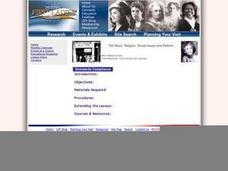


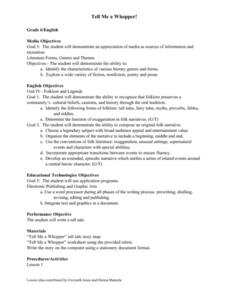



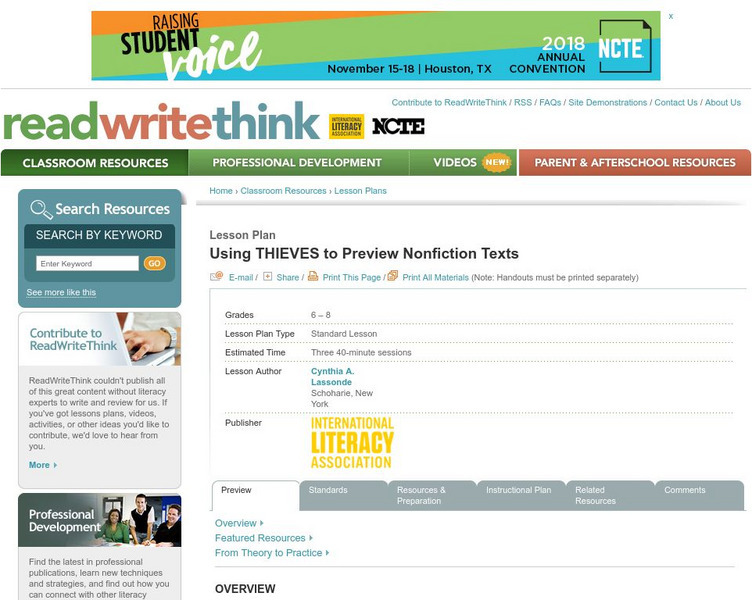

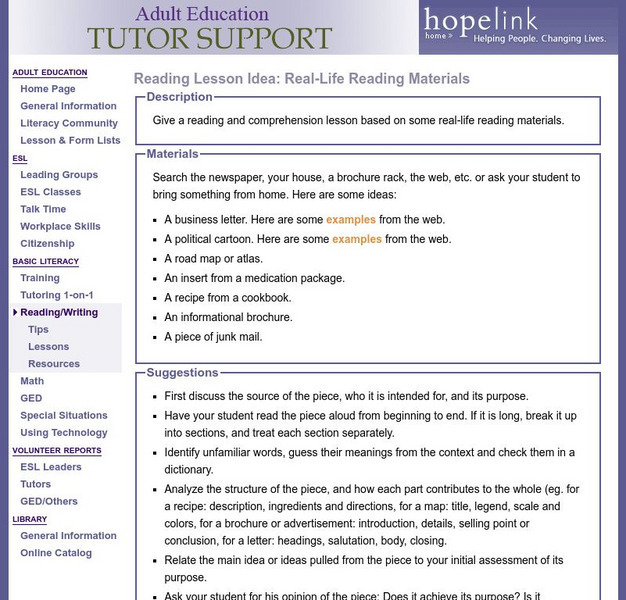

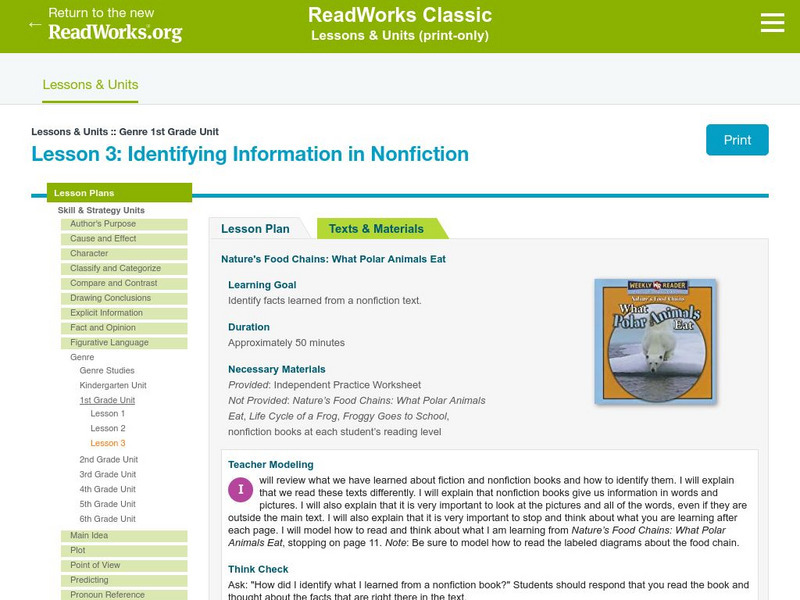
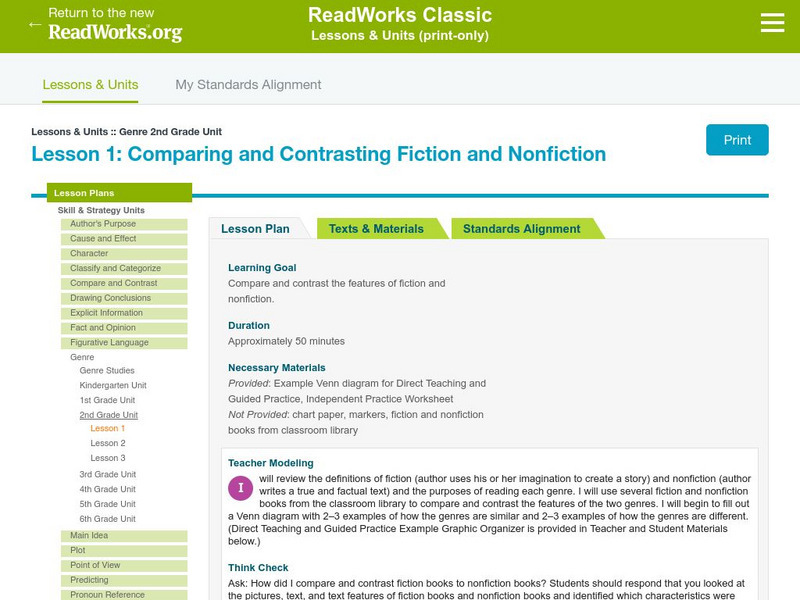

![Florida Center for Reading Research: Fiction and Nonfiction Sort [Pdf] Lesson Plan Florida Center for Reading Research: Fiction and Nonfiction Sort [Pdf] Lesson Plan](https://content.lessonplanet.com/knovation/original/509105-4469283d2301f2d80ae09183a55b8e2c.jpg?1661786967)








